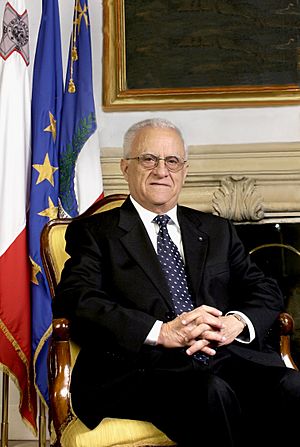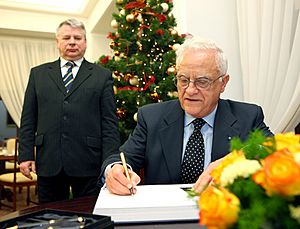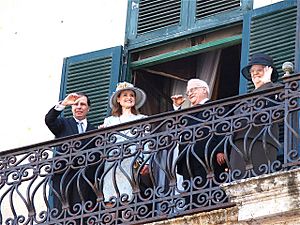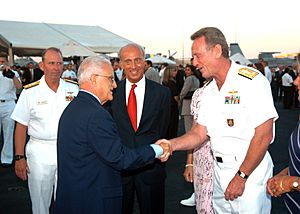Eddie Fenech Adami facts for kids
Quick facts for kids
Eddie Fenech Adami
|
|
|---|---|

Official portrait, 2007
|
|
| 7th President of Malta | |
| In office 4 April 2004 – 4 April 2009 |
|
| Prime Minister | Lawrence Gonzi |
| Preceded by | Guido de Marco |
| Succeeded by | George Abela |
| 10th Prime Minister of Malta | |
| In office 6 September 1998 – 23 March 2004 |
|
| President | Ugo Mifsud Bonnici Guido de Marco |
| Preceded by | Alfred Sant |
| Succeeded by | Lawrence Gonzi |
| In office 12 May 1987 – 28 October 1996 |
|
| President | Paul Xuereb Ċensu Tabone Ugo Mifsud Bonnici |
| Preceded by | Karmenu Mifsud Bonnici |
| Succeeded by | Alfred Sant |
| Leader of the Opposition | |
| In office 28 October 1996 – 6 September 1998 |
|
| President | Ugo Mifsud Bonnici |
| Prime Minister | Alfred Sant |
| Preceded by | Alfred Sant |
| Succeeded by | Alfred Sant |
| In office 11 April 1977 – 12 May 1987 |
|
| President | Anton Buttigieg |
| Prime Minister | Dom Mintoff Karmenu Mifsud Bonnici |
| Preceded by | Giorgio Borg Olivier |
| Succeeded by | Karmenu Mifsud Bonnici |
| Leader of the Nationalist Party | |
| In office 11 April 1977 – 3 March 2004 |
|
| Preceded by | Giorgio Borg Olivier |
| Succeeded by | Lawrence Gonzi |
| Personal details | |
| Born |
Edoardo Fenech Adami
7 February 1934 Birkirkara, Crown Colony of Malta |
| Political party | Nationalist Party |
| Spouse | Mary Fenech Adami |
| Children | 5 (including Beppe Fenech Adami) |
| Alma mater | Royal University of Malta |
| Profession | Lawyer |
| Signature |  |
| Website | http://eddiefenechadami.org/ |
Edoardo "Eddie" Fenech Adami (born 7 February 1934) is a Maltese Nationalist politician. He served as the prime minister of Malta from 1987 to 1996, and again from 1998 to 2004. After that, he became the seventh president of Malta, serving from 2004 to 2009.
Eddie Fenech Adami led his party to win four general elections. These victories happened in 1987, 1992, 1998, and 2003. He also won the most votes in the 1981 election. He strongly supported Malta joining the European Union. His efforts were very important for Malta to become a member.
Originally, Fenech Adami worked as a lawyer. He became a Member of Parliament (MP) in 1969. He held many important roles within his party. From 1977, he led the Nationalist opposition. He campaigned for democratic principles and human rights.
When he became Prime Minister in 1987, Fenech Adami started many changes. He worked to improve the economy and reduce unemployment. He also focused on modernizing Malta's buildings and services. Malta also began to connect more with the EU. The country officially applied to join in 1990.
Contents
Early Life and Education
Edward (Edoardo) Fenech Adami was born in Birkirkara, which was then part of British Malta. His mother was Josephine Fenech Adami, and his father was Luigi Fenech Adami, a customs officer. He was the fourth of five children. His early years were during World War II, a time of air raids and shortages in Malta.
He started school at St Aloysius' College in Birkirkara. He later studied at the Royal University of Malta. There, he studied economics, classics, and then law. He became a lawyer in 1959. He married Mary Sciberras, who passed away in 2011. They had five children: John, Beppe, Michael, Maria, and Luigi.
Starting His Political Journey
Fenech Adami joined the Nationalist Party in the early 1960s. He worked in various party roles, including editing its newspaper, Il-Poplu (meaning The People). He ran for Parliament twice without success in 1962 and 1966. He finally became a Member of Parliament in 1969. This happened after a special election filled a vacant seat.
In the 1970s, the Nationalist Party was in opposition. Fenech Adami spoke for the party on topics like jobs and social services. After losing two elections, the party looked for a new leader. This led to a meeting in 1977 where the party decided to choose a new leader.
Becoming Party Leader
In April 1977, Fenech Adami ran for the party leadership. He won with a large majority. He then started to modernize the Nationalist Party. This helped attract many new and younger members.
In October 1979, there was a serious incident known as Black Monday. A group of people attacked and burned down the offices of The Times of Malta newspaper. They also damaged several Nationalist Party clubs. Fenech Adami's own home in Birkirkara was ransacked. His wife, Mary, was attacked. The family had to escape by jumping to a neighbor's house. These events showed a rise in political violence. However, the attack made Fenech Adami's leadership stronger. A large crowd gathered outside his damaged home, showing support.
The Nationalist Party gained more support. In the 1981 elections, they won the most votes. However, they did not get the most seats in Parliament. This was due to how the voting districts were set up. Fenech Adami led a campaign of peaceful protest. His party boycotted Parliament for a time. They also asked supporters to avoid businesses that supported the government. This pressure helped lead to talks about changing the constitution. The goal was to prevent unfair election results in the future.
In November 1986, Nationalist Party supporters faced obstacles on their way to a meeting. The road was blocked, and some people were attacked. Police used tear gas and rubber bullets. Many people were injured. A month later, Raymond Caruana was killed by a stray bullet at a Nationalist Party club. Fenech Adami spoke out against this violence in Parliament. He argued that protecting freedom and democracy was most important for the Maltese people.
Prime Minister: First Term (1987–1996)
After some changes to the constitution, the party with the most votes would get a majority in Parliament. In 1987, the Nationalist Party won the general elections. They had a majority of 5,000 votes.
From 1987 to 1992, Fenech Adami brought many changes to Malta. Malta became more connected with other European countries. The country's infrastructure was greatly improved. This included new roads, a new airport, and new power stations. Rules for businesses were also changed to make the economy more open. Many state-owned companies were sold to private owners. Malta also started to join the European Economic Community. This meant slowly removing taxes on imports.
Fenech Adami was re-elected as Prime Minister in 1992. However, his popularity began to drop. This was partly because of new economic changes, like the introduction of VAT. The main opposition party also had a new, dynamic leader, Alfred Sant. The Nationalist Party lost the 1996 general elections.
Leader of the Opposition (1996–1998)

Between 1996 and 1998, Fenech Adami served as the Leader of the Opposition. The Labour government had only a one-seat majority. This led to a time of political instability. The Labour government changed some economic policies. They removed VAT and introduced new taxes.
The situation became difficult for the Labour government. They decided to call an early election. Fenech Adami's party won the election in September 1998. They had a majority of 13,000 votes.
Prime Minister: Second Term (1998–2004)

After returning to power, Fenech Adami restarted Malta's application to join the European Union. Negotiations were completed by December 2002. He successfully led the campaign for Malta to join the EU. This included the 2003 EU membership referendum. He also won the election that followed.
He signed Malta's Accession Treaty with the European Union on April 16, 2003. He represented Malta at many EU and Commonwealth meetings. In December 2003, he received the European of the Year Award. This was for his strong efforts to bring Malta into the European Union. Fenech Adami stepped down as Leader of the Nationalist Party in February 2004. He resigned as Prime Minister and left Parliament in March 2004. He was the longest-serving Prime Minister since Malta became independent.
President of Malta
After leaving his role as Prime Minister, Fenech Adami became the President of Malta on April 4, 2004. He served a five-year term. He left office on April 4, 2009. George Abela then became the next President.
Honours and Awards
Eddie Fenech Adami has received many awards and honours. These recognize his important work and service.
Maltese Honours
 Companion of Honour of the National Order of Merit (1990)
Companion of Honour of the National Order of Merit (1990)
Foreign Honours
 Grand-Cross of the Order of Prince Henry, Portugal (1994)
Grand-Cross of the Order of Prince Henry, Portugal (1994) Commander Grand-Cross of the Order of the Three Stars, Latvia (2004)
Commander Grand-Cross of the Order of the Three Stars, Latvia (2004) Grand Cross with Chain of the Order of the Star of Romania (2004)
Grand Cross with Chain of the Order of the Star of Romania (2004) Knight Grand-Cross with Grand Cordon of the Order of Merit of the Italian Republic (2005)
Knight Grand-Cross with Grand Cordon of the Order of Merit of the Italian Republic (2005) Honorary Knight Grand-Cross of the Order of the Bath, United Kingdom (2005)
Honorary Knight Grand-Cross of the Order of the Bath, United Kingdom (2005) Knight Grand-Cross of the Grand Order of King Tomislav, Croatia (2006)
Knight Grand-Cross of the Grand Order of King Tomislav, Croatia (2006) Grand Cross with Chain of the Order of Merit of Hungary (2007)
Grand Cross with Chain of the Order of Merit of Hungary (2007) Grand-Collar of the Order of Prince Henry, Portugal (2008)
Grand-Collar of the Order of Prince Henry, Portugal (2008) Knight of the Order of the White Eagle, Poland (2009)
Knight of the Order of the White Eagle, Poland (2009) Commander of the National Order of the Legion of Honour, France (2010)
Commander of the National Order of the Legion of Honour, France (2010)
Other Recognitions
Fenech Adami is an Honorary Member of the International Raoul Wallenberg Foundation.
See also
 In Spanish: Edward Fenech Adami para niños
In Spanish: Edward Fenech Adami para niños
- List of prime ministers of Malta
 | Delilah Pierce |
 | Gordon Parks |
 | Augusta Savage |
 | Charles Ethan Porter |


